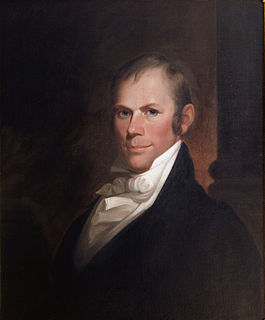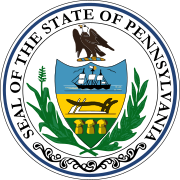
The 14th United States Congress was a meeting of the legislative branch of the United States federal government, consisting of the United States Senate and the United States House of Representatives. It met in the Old Brick Capitol in Washington, D.C. from March 4, 1815, to March 4, 1817, during the seventh and eighth years of James Madison's presidency. The apportionment of seats in the House of Representatives was based on the Third Census of the United States in 1810. Both chambers had a Democratic-Republican majority.

The 1868 and 1869 United States House of Representatives elections coincided with the 1868 United States presidential election, which was won by Ulysses S. Grant.

The 1820 and 1821 United States House of Representatives elections were held at various dates in different states between July 1820 and August 1821 as President James Monroe won reelection unopposed.

The 1818 and 1819 United States House of Representatives elections were held at various dates in different states between April 1818 and August 1819 during President James Monroe's first term. Also, newly admitted Alabama elected its first representatives in September 1819.

The 1816 and 1817 United States House of Representatives elections were held at various dates in different states between April 1816 and August 1817.

The 1814 and 1815 United States House of Representatives elections were held at various dates in different states between April 1814 and August 1815 during President James Madison's second term.

The 1794 and 1795 United States House of Representatives elections were held on various dates in each state between August 25, 1794, and September 5, 1795 (Kentucky). The election was held during President George Washington's second term.

The 1812 United States House of Representatives elections in New York were held from December 15 to 17, 1812, to elect 27 U.S. Representatives to represent the State of New York in the United States House of Representatives of the 13th United States Congress. At the same time, a vacancy was filled in the 12th United States Congress.

The 1814 United States House of Representatives elections in New York were held from April 26 to 28, 1814, to elect 27 U.S. Representatives to represent the State of New York in the United States House of Representatives of the 14th United States Congress.

The 1816 United States House of Representatives elections in New York were held from April 23 to 25, 1816, to elect 27 U.S. Representatives to represent the State of New York in the United States House of Representatives of the 15th United States Congress. At the same time, a vacancy was filled in the 14th United States Congress.

On August 2, 1813, Representative John Gloninger (F) of Pennsylvania's 3rd district resigned his seat. A special election to fill this vacancy was held on October 12, 1813. This was the first of two special elections held in the 3rd district in the 13th Congress.

On July 2, 1815, Representative-elect Amos Ellmaker (DR) of Pennsylvania's 3rd district resigned after being appointed and commissioned president judge of the Twelfth Judicial District of Pennsylvania, composed of the counties of Dauphin, Lebanon, and Schuylkill, and before the 14th Congress' first session began. A special election was held on October 10, 1815 to fill the vacancy left by his resignation.

On March 12, 1815, a few days after the legal start of the 14th Congress, but long before the first meeting of that Congress, David Bard (DR), who'd been re-elected to the 9th district, died. A special election was held on October 10 to fill the vacancy left by his death.

On December 15, 1815, having been elected to the Senate, Nathaniel Macon (DR) of North Carolina's 6th district resigned. To fill the vacancy left in North Carolina's representation for the 14th Congress, a special election was held on January 22, 1816.

In the 1816 elections in Pennsylvania, David Scott (DR) won one of the two seats in the 10th district, but resigned before the 15th Congress began, having been appointed judge of the court of common pleas. A special election was held on October 14, 1817 to fill the resulting vacancy.

During the 15th Congress, there were two special elections in the 6th district of Pennsylvania, both held in the year 1818. The 6th district at that time was a plural district with two seats, both of which became vacant at different times in 1818. The first vacancy was caused by John Ross (DR) resigning on February 24, 1818 and the second was caused by Samuel D. Ingham (DR) resigning July 6.

Kentucky held its elections August 3, 1814.

A special election was held August 26, 1817 in Massachusetts's 1st congressional district to fill a vacancy left by the resignation of Representative-elect James Lloyd (F) before the beginning of the 15th Congress.

Although elected in the 1814–1815 United States House of Representatives elections in Massachusetts, Daniel A. White (Federalist) of the 3rd district was offered, and accepted, the position of probate judge in Essex County before taking his seat in Congress.










